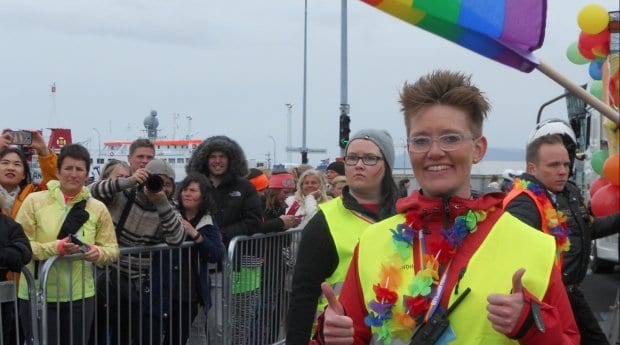Iceland is an exciting place, isolated in the North Atlantic, where the North American and Eurasian continents collide. This tiny country is home to the most active volcanoes in the world, and earthquakes happen basically every day.
The countless waterfalls, hot springs, geysers and lava fields are reminders that the earth is literally bursting open here. It’s the epitome of a new world. Maybe that’s what makes the Icelandic people so vibrant and active as well.
Iceland’s national assembly, the Althingi, was the first parliamentary democracy in the world, founded in 930 by Vikings interested in distributing resources, making laws and dispensing justice. Democracy and progressive social justice values continue to thrive here: homosexuality was decriminalized in 1940, Iceland was the first nation to democratically elect a female president, and in 2009 Jóhanna Sigurðardóttir became prime minister — the world’s first elected, openly lesbian head of government.
Iceland is also consistently ranked as one of the greenest and most literate countries in the world, and at the top of the United Nations’ quality of life index.
I’ve arrived here for Pride. It’s the last stop on a 2015 tour of my 2009 documentary Beyond Gay: The Politics of Pride that the Canadian embassies in Helsinki, Stockholm and Reykjavik have organized cooperatively.
The screening in Reykjavik draws a full house, the biggest audience of the tour.
“I think that we gained a lot by being such a small country because it’s easier to raise awareness when it’s a small group,” says Ugla Stefanía Jónsdóttir, a trans activist who sits on the panel following the film’s presentation.
“It’s usually that everybody knows someone that belongs to any of these groups,” Jónsdóttir says. “So it’s more difficult to be the asshole who is against someone because you will know someone eventually.”
Reykjavik Pride has exploded in popularity in recent years, along with Iceland’s tourism industry. It’s now the largest public event of the year, bigger than Reykjavik’s national holiday celebrations.
Like Sweden and Finland, the Icelandic government funds a national queer organization, Samtökin ’78 (which was founded in 1978), which plays a central role in the events of Reykjavik Pride week, as does the city.
Árni Grétar Jóhannsson is the owner of Kiki Queer Bar, the only queer bar in Reykjavik. He also recently completed a term as the head of Samtökin ’78.
“When people started coming out of the closet more and more, it was always someone’s nephew or niece or someone’s relative, and everybody knows everybody,” he says. “So the changes happened quite fast.”
Since 1996, when civil unions were granted to same-sex couples, “it has been endless progress,” he says.
He predicts that in the next five years, Iceland will have “a generation of young kids who went to their first Pride in a stroller and [have] gone ever since, and they know it’s just diversity of life.”
Reykjavik Pride has made a “huge difference,” he says. “We are raising people knowing that this is not a foreign thing, or something we don’t know what it is, or what it is about, because there is visibility and it has helped a lot, absolutely.”
“It’s totally different from when I went 19 years ago,” says Viktoria Gudnadottir, an Icelandic media artist who moved to the Netherlands 19 years ago to study, married a woman there and stayed. She returns regularly for vacation and, when possible, to attend Reykjavik Pride.
“It’s not acceptable to be against gay people,” she says. “It happened quicker here than in the Netherlands.”
“I’m glad that we are becoming way more inclusive because it used to be just gay Pride, but now it’s bi, trans, pan, asexual,” notes Ingunn Mia Blondal, a young, bisexual acting student from Reykjavik. “There is way more transparency when it comes to transgender and intersex — the discussion has been very open recently and it’s wonderful.”
“I think in Iceland right now it’s mainly about focusing on the trans and intersex population,” Jónsdóttir says. “We also need to start looking a bit beyond, because usually we just think about gay . . . It’s becoming more prominent to think about bisexuality now, but also about all of the other sexualities, like asexuality and pansexuality. And then trans people — especially trans people who don’t conform to male or female norms — don’t have any legal rights in Iceland, really. They couldn’t have access to any hormones or anything if they wish. And intersex people are still subjected to the surgeries.”
As Reykjavik Pride continues to grow and shifts to include more of the queer spectrum, it could be seen as the embodiment of its physical environment: constantly transforming into something new.

 Why you can trust Xtra
Why you can trust Xtra


